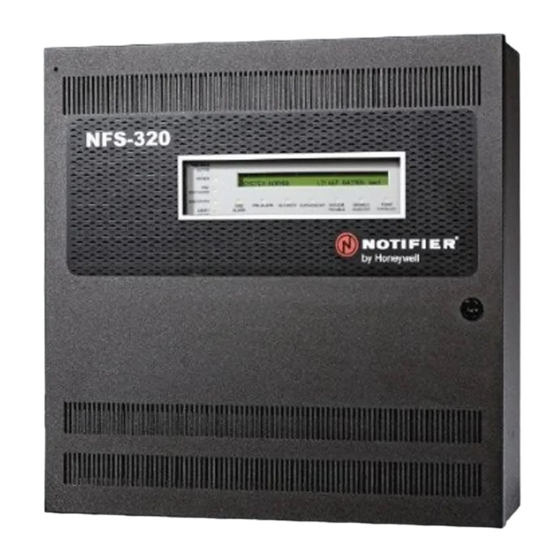
Table of Contents
Advertisement
Quick Links
Advertisement
Table of Contents

Summary of Contents for Honeywell Notifier NFS-320/E/C
- Page 1 Fire Alarm Control Panel Fire Alarm Control Panel NFS-320/E/C NFS-320/E/C Operations Manual Operations Manual Document 52747 Document 52747 12/28/2006 12/28/2006 Rev: Rev:...
- Page 2 Fire Alarm System Limitations Fire Alarm System Limitations While a fire alarm system may lower insurance rates, it is not a substitute for fire insurance! While a fire alarm system may lower insurance rates, it is not a substitute for fire insurance! An automatic fire alarm system An automatic fire alarm system—typically made up of ...
- Page 3 Fire Alarm System Limitations Fire Alarm System Limitations While a fire alarm system may lower insurance rates, it is not a substitute for fire insurance! While a fire alarm system may lower insurance rates, it is not a substitute for fire insurance! An automatic fire alarm system An automatic fire alarm system—typically made up of ...
- Page 4 GE Plastics, a subsidiary of General Electric Company. ©2006 by Honeywell International Inc. All ©2006 by Honeywell International Inc. All rights reserved. Unauthorized use of this document is strictly rights reserved. Unauthorized use of this document is strictly prohibited. prohibited.
- Page 5 Brief description of content you think should be improved or corrected • Your suggestion for how to correct/improve documentation Send email messages to: FireSystems.TechPubs@honeywell.com Please note this email address is for documentation feedback only. If you have any technical issues, please contact Technical Services. NFS-320/E/C Operations Manual — P/N 52747:A 12/28/2006...
-
Page 6: Table Of Contents
Table of Contents Section 1: General Information....................9 1.1: UL 864 Compliance............................9 1.2: About This Manual ............................9 1.2.1: Cautions and Warnings........................9 1.2.2: Typographic Conventions........................9 1.2.3: Supplemental Information ......................... 10 1.2.4: Shortcuts to Operating Functions .... - Page 7 Table of Contents 3.12.1: What are System Timers?........................33 3.12.2: How to View System Timer Selections...................33 3.12.3: How System Timers Work ......................33 3.13: Waterflow Circuit Operation........................34 3.14: Style 6 and Style 7 Operation ........................34 Section 4: Read Status Operation..................
- Page 8 Table of Contents C.4.1: Overview............................66 C.4.2: Accessing Alter Status Options ......................66 C.4.3: Enable or Disable Detectors, Modules or Zones ................67 C.4.4: Change Alarm and Pre-Alarm Levels....................67 C.4.5: Clear Verification Counter........................68 C.4.6: Clear the Entire History Buffer......................68 C.4.7: Set the Pre-Alarm for Alert or Action....................68 Appendix D: Point and System Troubles Lists ..............
- Page 9 Table of Contents NFS-320/E/C Operations Manual — P/N 52747:A 12/12/2006...
-
Page 10: Section 1: General Information
Section 1: General Information 1.1 UL 864 Compliance This product has been certified to comply with the requirements in the Standard for Control Units and Accessories for Fire Alarm Systems, UL 864 9th Edition. 1.2 About This Manual 1.2.1 Cautions and Warnings This manual contains cautions and warnings to alert the reader as follows: CAUTION: Information about procedures that could cause programming errors, runtime errors, or equipment... -
Page 11: 3: Supplemental Information
About This Manual General Information 1.2.3 Supplemental Information The table below provides a list of documents referenced in this manual, as well as documents for selected other compatible devices. The document series chart (DOC-NOT) provides the current document revision. A copy of this document is included in every shipment. Compatible Conventional Devices (Non-addressable) Document Number ... -
Page 12: 4: Shortcuts To Operating Functions
Introduction to the Control Panel General Information XP6-R Installation Document I56-1804 Table 1.2 Supplemental Documentation (2 of 2) 1.2.4 Shortcuts to Operating Functions To the left of each program function, you’ll find a keypad shortcut, which contains a series of keypad entries required to access the program function. All shortcuts start with the control panel in normal operation. - Page 13 Introduction to the Control Panel General Information NFS-320/E/C Operations Manual — P/N 52747:A 12/12/2006...
-
Page 14: Section 2: Use Of The Controls
Section 2: Use of the Controls 2.1 Introduction Listing of the controls and indicators and where to find information on their use: Operating Components Covered in Twelve System Status Indicator LEDs “System Status Indicator LEDs” on page 13 Five Control Keys “Control Keys”... -
Page 15: Control Keys
Control Keys Use of the Controls Indicator Color When Active To Turn Off Lights when any of the releasing zones have been Turns off automatically when no releasing DISCHARGE activated, but have not yet discharged a releasing zones are in the pre-discharge state. agent. -
Page 16: 2: Signal Silence
Control Keys Use of the Controls You can also press this key to display multiple alarms or troubles. If more than one alarm or tr ouble exists, the control panel displays the next alarm or trouble for 3 seconds (or until you press the key), then displays the next alarm or trouble. -
Page 17: Drill
Programming Keypad Use of the Controls 2.3.4 Drill Use the key to manually activate all silenceable outputs and Notification Appliance Circuits. DRILL To prevent accidental activation, you must press the key for 2 seconds. When pressed, the DRILL control panel does the following: •... - Page 18 Programming Keypad Use of the Controls Shown below is the Programming Keypad, with descriptions for the keys. key – press to display the next item in a list NEXT SELECTION or display the device at the next highest address key – press to display the previous item PREVIOUS SELECTION in a list or display the device at the next lowest address key –...
- Page 19 Programming Keypad Use of the Controls NFS-320/E/C Operations Manual — P/N 52747:A 12/12/2006...
-
Page 20: Section 3: Operation Of The Control Panel
Section 3: Operation of the Control Panel 3.1 Overview This section contains instructions for operating the control panel. Listed below are the topics detailed in this section: Section Refer to Page 3.2, "Normal Mode of Operation" page 19 3.3, "Fire Alarm Mode of Operation" page 20 3.4, "System Trouble Mode of Operation"...













